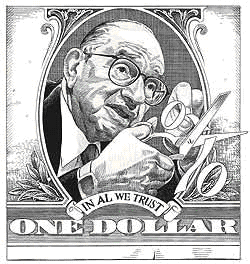US Economic Boom and Busts
Economics / US Economy Feb 25, 2008 - 07:27 AM GMTBy: Gerard_Jackson
 The US Economy: Been there before - There are times when in order to find out where we are we need to discover how we got there. And this is certainly the case with economies, and the US economy is no exception. This is why economic lessons are vitally important and why they need to be constantly aired lest the public be led astray by demagogues and economic illiterates. (Think Obama and Hillary Clinton). One of the most important lessons that was largely disregarded in the 1990s is that booms are always followed by busts. (The dishonest US mainstream media's response to this fact is to blame recessions on Republicans and always credit Democrats with the good times).
The US Economy: Been there before - There are times when in order to find out where we are we need to discover how we got there. And this is certainly the case with economies, and the US economy is no exception. This is why economic lessons are vitally important and why they need to be constantly aired lest the public be led astray by demagogues and economic illiterates. (Think Obama and Hillary Clinton). One of the most important lessons that was largely disregarded in the 1990s is that booms are always followed by busts. (The dishonest US mainstream media's response to this fact is to blame recessions on Republicans and always credit Democrats with the good times).
 Rather than look to economic history and well-tried theory for guidance commentators, and many economists too, interpreted the boom as a "new era", one that had "abolished the business cycle". The very same things were said during the 1920s boom. One should have thought that this would have alerted reasonably intelligent commentators to the distinct possibility of another American recession. Not a bit of it. Instead they blamed Bush for the recession even though it emerged during Clinton's second term
Rather than look to economic history and well-tried theory for guidance commentators, and many economists too, interpreted the boom as a "new era", one that had "abolished the business cycle". The very same things were said during the 1920s boom. One should have thought that this would have alerted reasonably intelligent commentators to the distinct possibility of another American recession. Not a bit of it. Instead they blamed Bush for the recession even though it emerged during Clinton's second term
By and large, during the 1990s the economic commentariat appeared to think of the American economy as a mysterious beast capable of defying the laws of nature in general and economic gravity in particular. But there is nothing new or mysterious about the Clinton boom. It was an old story that has been continually repeating itself since before the dawn of the industrial age and will continue to do so until sound economic thinking makes a triumph return.
I have spent years stressing that the so-called boom-and-bust cycle is a monetary phenomenon. It is not and never has been a product of market forces, greed or mass mania's, which are only the visible signs of strong undercurrents of monetary disturbances. We need only remind ourselves that money is neither neutral nor passive. This is something that the Austrian school fully understands. As Fritz Machlup put it:
. . monetary factors cause the [business] cycle but real phenomena constitute it, Essays on Hayek , Routledge, Kegan Paul 1977, p. 23).
And this will remain the case until the economics profession acquires a vastly better understanding of the nature of money and interest rates. On numerous occasions I have tried to explain that money is an incredibly active agent that will create clusters of malinvestments by misdirecting production during the course of a boom. Credit expansion is the means by which this is accomplished. As credit expansion is part of the money supply it is the responsibility of the Federal Reserve to control it. Instead it allowed a reckless if not criminal expansion of credit to take place. Bernanke is now doing all he can to repeat its mistake.
 It was Greenspan's policy of credit expansion that fuelled the boom, triggered the hi-tech stock mania, blew the current account out and encouraged reckless borrowing. But it's a story I have told so many times I'm beginning to understand how Cassandra felt when King Priam ignored her warning of Greeks bearing gifts. But like treachery and deceit, the erroneous ideas that justify credit expansion will always be with us, forever inserting their insidious presence into every government's economic policy. And that includes governments of every political persuasion.
It was Greenspan's policy of credit expansion that fuelled the boom, triggered the hi-tech stock mania, blew the current account out and encouraged reckless borrowing. But it's a story I have told so many times I'm beginning to understand how Cassandra felt when King Priam ignored her warning of Greeks bearing gifts. But like treachery and deceit, the erroneous ideas that justify credit expansion will always be with us, forever inserting their insidious presence into every government's economic policy. And that includes governments of every political persuasion.
Let's look at some figures. Dr Frank Shostak pointed out that in January 1980 the money base stood at $132 billion. By the end of April 2000 it stood at $574.2 billion, a 335 per cent rise. No wonder the federal funds rate fell from 17.6 per cent in 1980 to 3 per cent in 1993. Interesting enough, it was estimated that the money base shrank by about $45 billion dollars once Greenspan started to raise rates. But did credit shrink? No. (Most people still do not understand that cash deposits and bank credit are not identical).
That consumer spending rose by 8.3 per cent in the last quarter of 2000 was not evidence that credit was still expanding. To put it simply: the Fed flooded America with credit. Credit has much in common with a house flooded by burst water pipes. Even though the water is turned off it will still take time to drain the remaining water out of the structure and dry the place out. In other words, there is a time element. Nevertheless, even if credit when credit is still expanding a shrinking cash base would eventually end the expansion it and bring on a credit crunch. Moreover, as I have explained before, real forces eventually move to burst the boom, no matter what happens to M1.
On final point needs to be considered. I have warned that it's possible that encouraging consumption could retard the demand for labour in the higher stages of production. Hence the demand for labour at the consumption stage and in services could rise while the demand in manufacturing remained sluggish. Of course, there is the possibility that even if manufacturing is expanding it could lose labour to the lower stages of production if spending on consumer goods is sufficiently intensive. This would be just another case of credit expansion distorting the structure of relative prices.
By Gerard Jackson
BrookesNews.Com
Gerard Jackson is Brookes' economics editor.
Copyright © 2008 Gerard Jackson
Gerard Jackson Archive |
© 2005-2022 http://www.MarketOracle.co.uk - The Market Oracle is a FREE Daily Financial Markets Analysis & Forecasting online publication.


